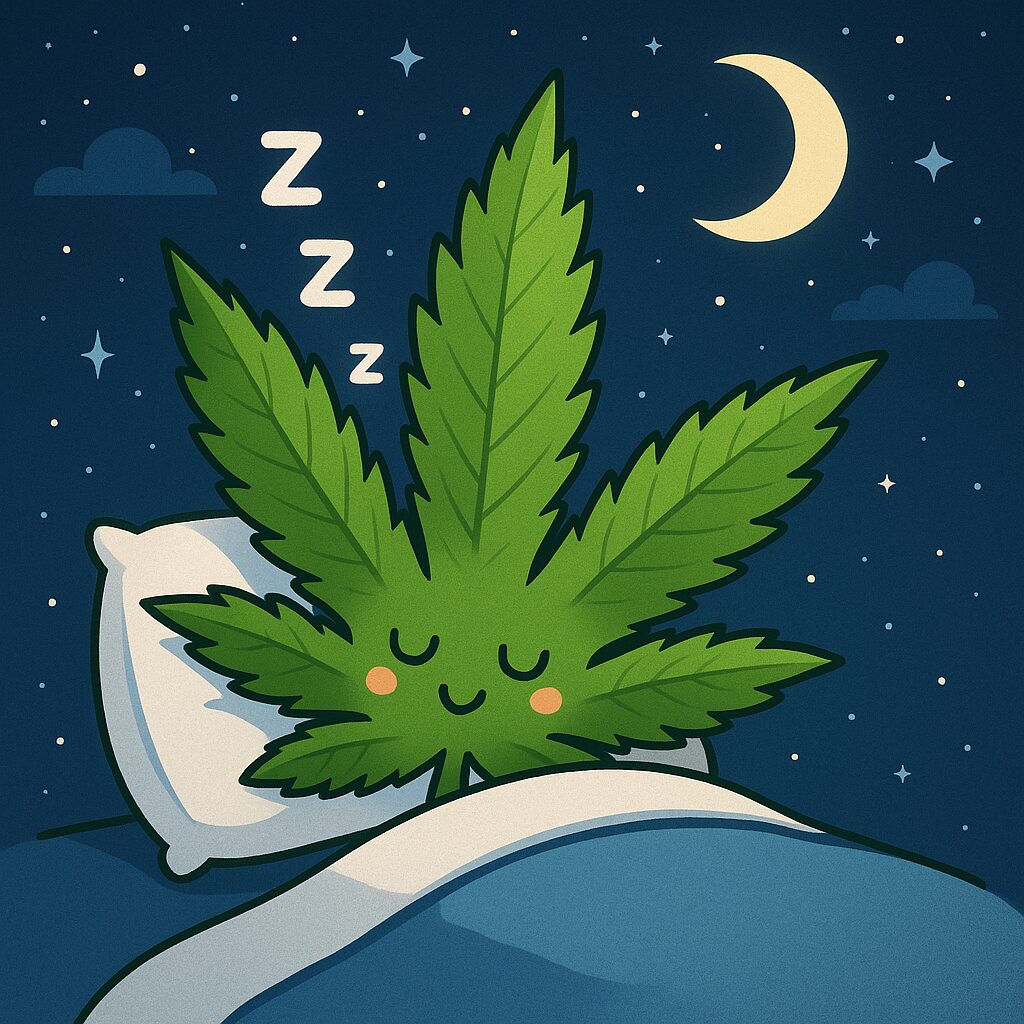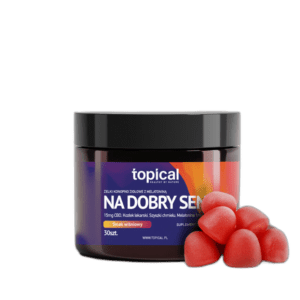Insomnia is a problem that affects millions of people around the world - from difficulty falling asleep to frequent nighttime awakenings. In 2025, as more and more people seek natural alternatives to pharmaceuticals, cannabis is becoming a star in the fight for better sleep. Two cannabinoids - CBD (cannabidiol) and CBN (cannabinol) - have gained particular attention for their potential relaxant and sedative properties. But how exactly do they work? Is it just another wellness trend or a scientifically backed method? In this article, we explore how CBD and CBN can help with insomnia, based on the latest research, and suggest how to safely incorporate them into your evening routine. Get ready for a journey into the world of cannabis that could transform your nights!
What are CBD and CBN?
Hemp (Cannabis sativa L.) is a plant that contains more than 100 cannabinoids, of which CBD and CBN stand out in the context of sleep. CBD is a non-psychoactive compound that has gained popularity for its anti-anxiety, anti-inflammatory and analgesic properties. It acts on the endocannabinoid system, which regulates key bodily functions such as sleep, mood and stress response.
CBN, on the other hand, is formed by the degradation of THC (tetrahydrocannabinol) and is considered a cannabinoid with potential sedative effects, although research on it is less advanced. In Poland, CBD products are legal as long as they contain less than 0.3% THC, making them available in pharmacies and specialty stores. CBN, due to its origins in THC, may be more heavily regulated, so it's crucial to choose products with lab certifications that confirm their composition and safety.
How does CBD support sleep?
CBD works by modulating the endocannabinoid system, which plays a key role in regulating the sleep-wake cycle. By interacting with CB1 and CB2 receptors, CBD can affect neurotransmitters such as serotonin, which helps reduce anxiety - one of the main causes of insomnia. A 2019 study in The Permanente Journal (The Permanente Journal) showed that 66.7% of participants taking 25 mg of CBD daily for one month noticed an improvement in sleep quality, and 79.2% reported a reduction in anxiety.
Another study from 2023 in Journal of Clinical Sleep Medicine confirmed that CBD in doses of 15-50 mg can increase sleep duration and reduce nighttime awakenings, which is particularly beneficial for people with chronic insomnia. CBD can also relieve pain that often makes it difficult to fall asleep, such as in people with arthritis or fibromyalgia. In this way, CBD creates the ideal conditions for restful sleep, acting indirectly by reducing obstructions.
How does CBN affect sleep?
CBN, dubbed the "sleepy cannabinoid," has gained popularity due to anecdotal accounts of its sedative properties. It is formed when THC in cannabis undergoes aging and oxidation, making it mildly psychoactive, but much milder than THC. Initial studies, such as a 1975 experiment on mice, showed that CBN can increase sleep time (PubMed).
Although clinical data is limited, users report that CBN helps them fall asleep faster and sleep deeper, especially when combined with CBD. In 2025, products with CBN, such as oils and jellies, are becoming increasingly popular, especially in a 1:1 CBD:CBN formula, which can work synergistically due to the entourage effect. However, the lack of large clinical trials means that CBN's effectiveness is based mainly on user experience, which calls for caution in its use.
Comparison of CBD and CBN in the fight against insomnia
CBD and CBN have different mechanisms of action, making them complementary in the treatment of insomnia. CBD works indirectly to relieve anxiety, stress and pain, which are common causes of sleep difficulties. Its effects are well documented, with numerous studies confirming its effectiveness in improving sleep quality. CBN, on the other hand, is potentially more sedative, which can directly promote the process of falling asleep and deeper sleep. However, research on CBN is less advanced, and its effects may be more variable depending on dose and individual response.
Products that combine CBD and CBN, such as 1:1 oils, are gaining popularity in 2025 because they can offer synergistic benefits - relaxation from CBD and sedation from CBN. The key is to test small doses to find the ideal combination that best suits your needs.
How to use CBD and CBN to improve sleep?
To effectively use CBD and CBN in the fight against insomnia, it is worth following a few practical rules:
- Start with low doses: The recommended starting dose is 5-25 mg of CBD or 2-10 mg of CBN, taken 30-60 minutes before bedtime. Doses that are too high can paradoxically cause hypervigilance, especially with CBD.
- Choose the appropriate form of the product: The sublingual oils work quickly (15-30 minutes), which is ideal for people who want to fall asleep quickly. Gels and capsules have a longer duration of action (4-8 hours), which supports maintaining sleep throughout the night. Vaporizers are less recommended before bedtime due to their quick but short-lived effects.
- Apply regularly: The effects may require several days of use to become fully effective. Keep a sleep diary to monitor progress.
- Choose quality: Look for products with lab certifications that confirm the absence of THC and impurities (Leafly). In Poland, CBD products are widely available, but CBN may need to be checked more carefully.
- Consult your doctor: If you are taking sleeping, anti-anxiety or other medications, consult your doctor to avoid interactions.
For example, you can add a few drops of CBD oil to your chamomile tea or eat a CBN gel as part of your evening ritual. It's important to create a calm environment - turn off the screens, dim the lights and let the cannabinoids work.
Potential side effects and precautions
CBD and CBN are generally well tolerated, but can cause side effects, especially at higher doses. The most common are:
- Dry mouth: Typical effect of cannabinoids, which can be mitigated by drinking water.
- Dizziness: Especially with CBN, which can be slightly psychoactive.
- Daytime fatigue: Doses that are too high can cause drowsiness in the morning.
- Appetite changes: CBD can affect appetite, though usually to a lesser degree than THC.
CBN, as a cannabinoid derived from THC, can produce subtle psychoactive effects, requiring caution in those sensitive to cannabinoids or with a history of mental illness. Both compounds can interact with drugs metabolized by the liver, such as benzodiazepines and antidepressants, so consultation with a doctor is essential. It's also important to avoid products of unknown composition, which may contain trace amounts of THC, which can be problematic in drug tests or for those avoiding psychoactive effects.
In 2025, CBD and CBN are promising natural remedies for insomnia that have revolutionized approaches to sleep. CBD, with its anti-anxiety and analgesic properties, creates the ideal conditions for restful sleep, while CBN can act more sedative, promoting deeper rest. While research on CBD is more advanced, CBN is gaining traction with anecdotal accounts and preliminary data.
The keys to success are low doses, high-quality products and regularity of use. If you're struggling with insomnia, hemp can be your ally - as long as you approach it with care and awareness. Try CBD or CBN and discover how the natural power of hemp can transform your nights!
How is CBD different from CBN in the context of sleep?
CBD is non-psychoactive and promotes sleep by reducing anxiety and pain, which often make it difficult to fall asleep. CBN, derived from the degradation of THC, may have a more direct sedative effect, although research on it is limited.
How does CBD help with insomnia?
CBD relieves anxiety, stress and pain, which are common causes of insomnia. Studies show that it can extend sleep time and reduce nighttime awakenings, improving the quality of rest.
Is CBN better than CBD for sleep?
It depends on individual needs. CBD is better studied and works indirectly to alleviate obstacles to sleep, while CBN may be more sedative, promoting deeper sleep. Products combining both cannabinoids may be most effective.
What doses of CBD and CBN are recommended for sleep?
Start with 5-25 mg of CBD or 2-10 mg of CBN, taken 30-60 minutes before bedtime. Adjust the dose according to your body's response, starting with the lowest value.
Are there side effects of CBD and CBN?
Possible effects include dry mouth, dizziness, fatigue or changes in appetite. CBN can be slightly psychoactive, so sensitive individuals should be cautious. Consult your doctor if you are taking medication.
Can I combine CBD and CBN for better sleep?
Yes, the combination of CBD and CBN can work synergistically due to the entourage effect, but start with low doses of both cannabinoids to assess the body's response.
How long does the effect of CBD and CBN on sleep last?
Effects appear within 15-120 minutes, depending on the form of the product. Oils work faster (15-30 minutes), while edibles, like jelly beans, last longer (4-8 hours).
Are CBD and CBN legal in Poland?
CBD is legal in Poland if it contains less than 0.3% THC. CBN, as a derivative of THC, may be more heavily regulated, so always check local regulations and product certifications.








